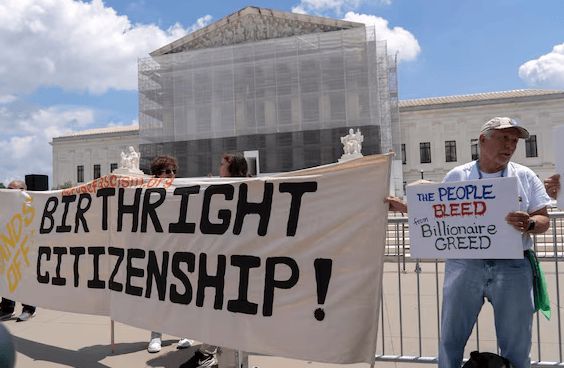A federal judge has temporarily blocked President Donald Trump’s controversial executive order that aimed to end birthright citizenship for certain U.S.-born children. The ruling, issued in New Hampshire, comes despite a recent U.S. Supreme Court decision limiting judicial authority to issue nationwide injunctions.
The case was brought forward by the American Civil Liberties Union (ACLU) as a class-action lawsuit on behalf of immigrant parents and their newborns. The judge not only allowed the lawsuit to proceed, but also issued a temporary halt to the enforcement of Trump’s policy—just weeks before it was set to take effect on July 27.
🧷 What’s at Stake?
At the heart of the dispute is the 14th Amendment of the U.S. Constitution, which guarantees citizenship to anyone born on American soil. Trump’s order aimed to revoke that right for babies born to undocumented immigrants or foreign nationals, a dramatic shift in long-standing U.S. immigration policy.
Immigrant rights groups have labeled the move unconstitutional, arguing it targets vulnerable populations and contradicts the foundational values of the nation.
⚖️ How the Courts Are Involved
The timing of the lawsuit is crucial. It was filed after the Supreme Court's recent 6–3 ruling that narrowed the power of lower courts to issue nationwide injunctions. However, the court left the door open for legal challenges through class-action lawsuits, which is exactly how the ACLU structured their case.
By certifying the case as a class action, the judge was able to issue a binding injunction that blocks the executive order from taking effect—at least temporarily. The federal government now has seven days to appeal.
🗣️ White House Reaction
The Trump team quickly condemned the decision. Spokesman Harrison Fields stated:
"Today's decision is an obvious and unlawful attempt to circumvent the Supreme Court's clear order… The Trump Administration will be fighting vigorously against the attempts of these rogue district court judges."
This isn't the first time the Trump administration has run into legal obstacles over this policy. Since the order was introduced early in Trump’s presidency, multiple courts have issued temporary holds while reviewing constitutional concerns.
🧠 Why This Matters
This ruling underscores a few major legal and political dynamics:
Birthright citizenship—a principle rooted in post-Civil War law—is facing renewed attacks.
The balance of power between the executive branch and the judiciary is shifting after the Supreme Court’s recent move to restrict universal injunctions.
This case may ultimately force the Supreme Court to address the core constitutional issue: Can birthright citizenship be stripped by executive order?
What do you think—can a president legally change birthright citizenship? Comment below.

